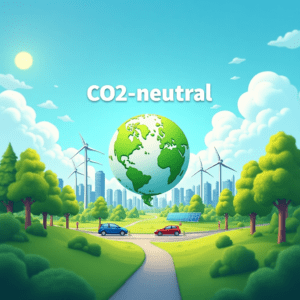CO2 certificates are tradable permits that allow companies and organizations to emit a specific amount of carbon dioxide (CO2) or other greenhouse gases. These certificates are part of a market designed to reduce greenhouse gas emissions and combat climate change. Each certificate usually represents one ton of CO2 that may be emitted.
The basic idea behind this system is that companies that reduce their emissions below the set limit can sell their surplus certificates. This creates a financial incentive to promote more environmentally friendly technologies and practices. The idea of CO2 certificates arose from the need to combat climate change and reduce global emissions.
In many countries and regions, emissions trading systems have been introduced to meet the goals of the Paris Agreement. These systems are designed to provide companies with some flexibility while establishing a clear framework for reducing emissions. By trading CO2 certificates, companies can not only manage their own emissions but also contribute to creating a market that promotes environmentally friendly innovations.
Key Takeaways
- I. What are CO2 Certificates?
- CO2 certificates are tradable rights that allow companies to emit a specific amount of CO2.
- They serve as a tool for regulating and reducing greenhouse gas emissions.
- II. How do CO2 Certificates work?
- Companies receive a certain number of certificates representing their allowed CO2 emissions.
- They can trade, buy, or sell these certificates depending on whether they reduce or exceed their emissions.
- III. What impact do CO2 certificates have on climate change?
- CO2 certificates contribute to reducing greenhouse gas emissions, helping to mitigate climate change.
- They promote the development and use of environmentally friendly technologies.
- IV. How do CO2 certificates affect the economy?
- CO2 certificates may lead to costs for companies that need to reduce their emissions.
- At the same time, they create incentives for investments in climate-friendly technologies and innovations.
- V. What role do CO2 certificates play in international climate policy?
- CO2 certificates are an important part of international climate agreements and initiatives to reduce greenhouse gas emissions.
- VI. What benefits do CO2 certificates offer companies?
- Companies can save costs through the trade of CO2 certificates while demonstrating their commitment to climate protection.
- VII. What challenges exist in implementing CO2 certificates?
- Setting appropriate emission limits and preventing fraud are key challenges in implementing CO2 certificates.
- VIII. How can individuals benefit from CO2 certificates?
- As an individual, you can contribute to compensating for your own CO2 emissions by purchasing CO2 certificates and actively participating in climate protection.
How do CO2 Certificates work?
How do CO2 Certificates work?
The functioning of CO2 certificates is based on a system of supply and demand. Governments or international organizations set a cap on the total amount of CO2 emissions allowed within a specific period. This cap is then converted into a specific number of certificates, which are distributed to companies.
The trade of CO2 certificates
Each company receives a certain number of certificates based on its historical emissions or other criteria. If a company reduces its emissions and requires fewer certificates, it can sell the surplus certificates to other companies that may struggle to reduce their emissions. The trade of CO2 certificates creates a market where the price of the certificates is determined by supply and demand.
The price of CO2 certificates
If many companies reduce their emissions and want to sell certificates, the price decreases. Conversely, the price increases if many companies need to buy certificates to offset their emissions. This pricing system motivates companies to invest in technologies that can lower their emissions since they can earn additional revenue by selling surplus certificates.
An economic incentive for the environment
In this way, an economic incentive is created that offers both ecological and economic benefits.
What impact do CO2 certificates have on climate change?
The impact of CO2 certificates on climate change is multifaceted and can be both positive and negative. On the positive side, they help reduce the overall amount of greenhouse gas emissions by creating a financial incentive for companies to lower their emissions. By setting an emissions cap, a clear framework is established that enables companies to meet their environmental goals.
In many regions, emissions trading systems have already led to significant reductions in CO2 emissions, contributing to the fight against climate change. However, there are also critical voices pointing out that CO2 certificates do not always deliver the desired results. In some cases, companies may simply buy certificates rather than actually reducing their emissions.
This could make the system less effective than intended. Additionally, there are concerns about the distribution of certificates and the potential for market manipulation. It is crucial that systems are transparent and well-regulated to ensure they truly contribute to the reduction of greenhouse gas emissions.
How do CO2 certificates affect the economy?
CO2 certificates have far-reaching effects on the economy. On one hand, they create new markets and business opportunities for companies that develop innovative technologies to reduce emissions. These technologies can range from renewable energy to energy-efficient production methods.
Companies investing in such technologies can not only lower their own costs but also profit from the sale of surplus certificates. This not only promotes the growth of green technologies but may also create jobs in these sectors. On the other hand, CO2 certificates can also pose challenges for certain industries.
Companies in emissions-intensive sectors may face higher costs if they need to reduce emissions or purchase certificates. This could lead to a competitive disadvantage in international trade, especially if other countries do not have similar regulations. Therefore, it is important for governments and international organizations to find a balanced approach to ensure that the economic impacts of CO2 certificates are both positive and sustainable.
What role do CO2 certificates play in international climate policy?
In international climate policy, CO2 certificates play a crucial role in achieving global climate goals. They are a central tool within the Paris Agreement, which aims to limit global warming to below 2 degrees Celsius. By trading CO2 certificates, countries can more flexibly meet their emission targets while simultaneously promoting the global market for green technologies.
This allows countries with different economic conditions and resources to work together towards a common goal. Additionally, CO2 certificates promote cooperation between countries and regions. Through the exchange of certificates, countries can learn from one another and share best practices.
This can help countries make faster progress in reducing their emissions while benefiting from economic advantages. The international dimension of CO2 certificate trading is crucial for the success of global climate protection measures and demonstrates the potential for a coordinated response to climate change.
What benefits do CO2 certificates offer companies?
For companies, CO2 certificates offer numerous benefits. First, they provide a financial incentive to reduce emissions. By investing in environmentally friendly technologies, companies can not only reduce their own costs but also generate revenue from the sale of surplus certificates.
This can be particularly advantageous for companies that can significantly reduce their emissions and gain a competitive edge in the market. Another advantage is the positive image companies can gain by demonstrating their commitment to sustainability. In an era where consumers increasingly value environmentally friendly practices, active engagement in CO2 reduction can strengthen customer trust and open new business opportunities.
Companies can position themselves as leaders in sustainability, thereby increasing their market share and building long-term relationships with customers.
What challenges exist in implementing CO2 certificates?
Despite their benefits, CO2 certificates face several challenges in their implementation. One of the biggest challenges is accurately measuring and monitoring emissions. To ensure the system is fair and effective, companies must be able to report their emissions transparently.
This requires robust systems for data collection and analysis, as well as clear guidelines for verifying this data. Without reliable monitoring, trust in the system could be undermined. Another issue is the potential inequality in the distribution of certificates.
In some cases, larger companies or those with more resources may have an unfair advantage in trading certificates. This could disadvantage smaller companies and lead to a concentration of market shares. To address these challenges, it is important for governments and regulatory authorities to develop clear guidelines and mechanisms to ensure the system remains fair and transparent.
How can individuals benefit from CO2 certificates?
As an individual, you can benefit from CO2 certificates in various ways. First, you can contribute to reducing emissions through your own behavior. By making environmentally friendly choices – whether by using public transportation, purchasing energy-efficient devices, or supporting sustainable products – you can help reduce the demand for CO2 certificates, thus having a positive impact on climate change.
Additionally, there are opportunities for individuals to directly invest in projects or participate in initiatives related to CO2 certificates. Many organizations offer programs where you can contribute to reforestation or the development of renewable energy. These projects often generate CO2 certificates, allowing you to actively participate in climate protection while benefiting from the positive effects on the environment.
If you want to learn more about climate change, specifically the role of greenhouse gases, I recommend the article “The Role of CO2 in the Greenhouse Effect.” This article provides a detailed explanation of how CO2 contributes to global warming and why reducing CO2 emissions is crucial for combating climate change. It is an excellent supplement to deepen your understanding of the impact of CO2 certificates on climate change.



